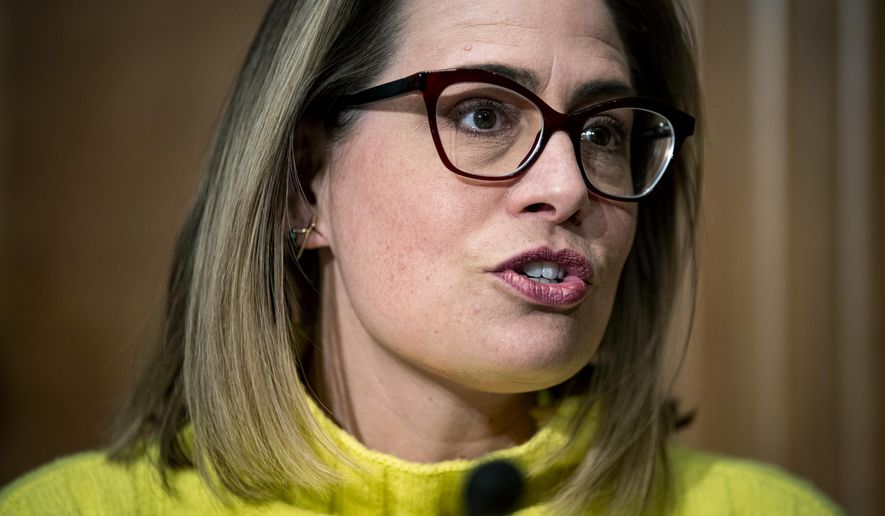Republican senators teed off against Democrats’ $740 billion climate and tax spending package Wednesday, intensifying their campaign to derail the legislation as the lone Democratic holdout faced mounting pressure from both sides of the aisle.
Centrist Democrat Sen. Kyrsten Sinema of Arizona is Republicans’ last hope to crash and burn the White House-backed Inflation Reduction Act, a measure that Democrats hope to pass along party lines in the coming days and focuses on climate, energy, health care and tax hikes.
But the Arizona lawmaker, whom Democrats need in the evenly divided Senate to give President Biden a major victory, isn’t tipping her hand. She is waiting for a ruling from the Senate parliamentarian on whether the legislation’s provisions will be allowed under the budget process, the timing of which is unknown.
“Taking my time,” Ms. Sinema told reporters Wednesday.
Republicans, Democrats and the White House continued to speak for an audience of one.
“We have an economically destructive tax increase in this proposal, combined with price controls that will stifle innovation, all to pay for corporate welfare for green energy and subsidize wealthy people buying Teslas and buying Obamacare,” said Sen. Pat Toomey, Pennsylvania Republican.
GOP senators have pointed to analyses, such as from Congress’ nonpartisan Joint Committee on Taxation and the Penn-Wharton Budget Model, showing that the 15% minimum corporate tax rate included in the bill would impact low- and middle-income earners and have little — if any — reduction in inflation.
“It’s a 725-page bill that would cost more than $1 billion per page,” said Sen. John Barrasso, Wyoming Republican.
Sen. Rob Portman, Ohio Republican, suggested Democrats should instead call it the “Inflation Increase Act.”
SEE ALSO: Most Americans support measures in Inflation Reduction Act, poll shows
Ms. Sinema has previously expressed reservations during Mr. Biden’s tenure about changing tax policy, including the limitation of carried interest that provides tax benefits to venture capitalists and private equity firms. Such a measure is currently included and would raise $14 billion in new revenue, per Democrats’ estimates.
After Ms. Sinema spoke with the head of the Arizona Chamber of Commerce and Industry on Tuesday, reports emerged Wednesday that Democrats may need to rethink their tax provisions in order to get the moderate on board.
Democrats, including Sen. Joe Manchin III of West Virginia, have argued the bill would simply close loopholes exploited by the nation’s largest corporations and wealthiest individuals to bring in new revenue to offset the climate and health care costs, in addition to reducing the deficit by $300 billion over the next decade.
The centrist Democrat crafted the legislation with Senate Majority Leader Charles E. Schumer, New York Democrat, and has been courting Ms. Sinema’s support both publicly and privately.
“She’ll make her decision based on the facts. She’s always been extremely vital. She works hard,” Mr. Manchin told reporters. “She makes a good decision based on facts, and I’m relying on it.”
As evidence that the Inflation Reduction Act would hold true to its name, Democrats have pointed to an analysis by the nonpartisan Committee for a Responsible Federal Budget that shows it would reduce the deficit by $1.9 trillion over two decades, have modest inflation reduction and not raise taxes on those making less than $400,000.
“It will indirectly affect those households in a number of ways, but even then, the net effect is likely to be to increase their real disposable income,” the CRFB wrote in a memo.
Democrats and the White House have also touted the endorsement of five former Treasury secretaries who served in administrations of both political parties, including Larry Summers under President Bill Clinton and Hank Paulson under President George W. Bush.
An analysis by the nonpartisan Congressional Budget Office released Wednesday found the bill would reduce the deficit by roughly $306 billion through 2031, when taking into account the revenue to be raised through beefed-up IRS enforcement.
Republicans have argued more IRS enforcement would result in more audits for the middle class.
The White House declined to say whether it has spoken directly with Ms. Sinema. It has instead advertised the seal of approval from the former Treasury secretaries and emphasized high poll numbers for the bill’s core policies.
“These high-level officials from both parties reaffirmed that this package will cut many of families’ biggest costs and act against inflation,” said White House press secretary Karine Jean-Pierre. “They also became the latest in a long list of experts who have debunked congressional Republicans’ lies meant to protect tax welfare for wealthy special interests at any cost, even prolonging inflation.”
• Ramsey Touchberry can be reached at rtouchberry@washingtontimes.com.




Please read our comment policy before commenting.